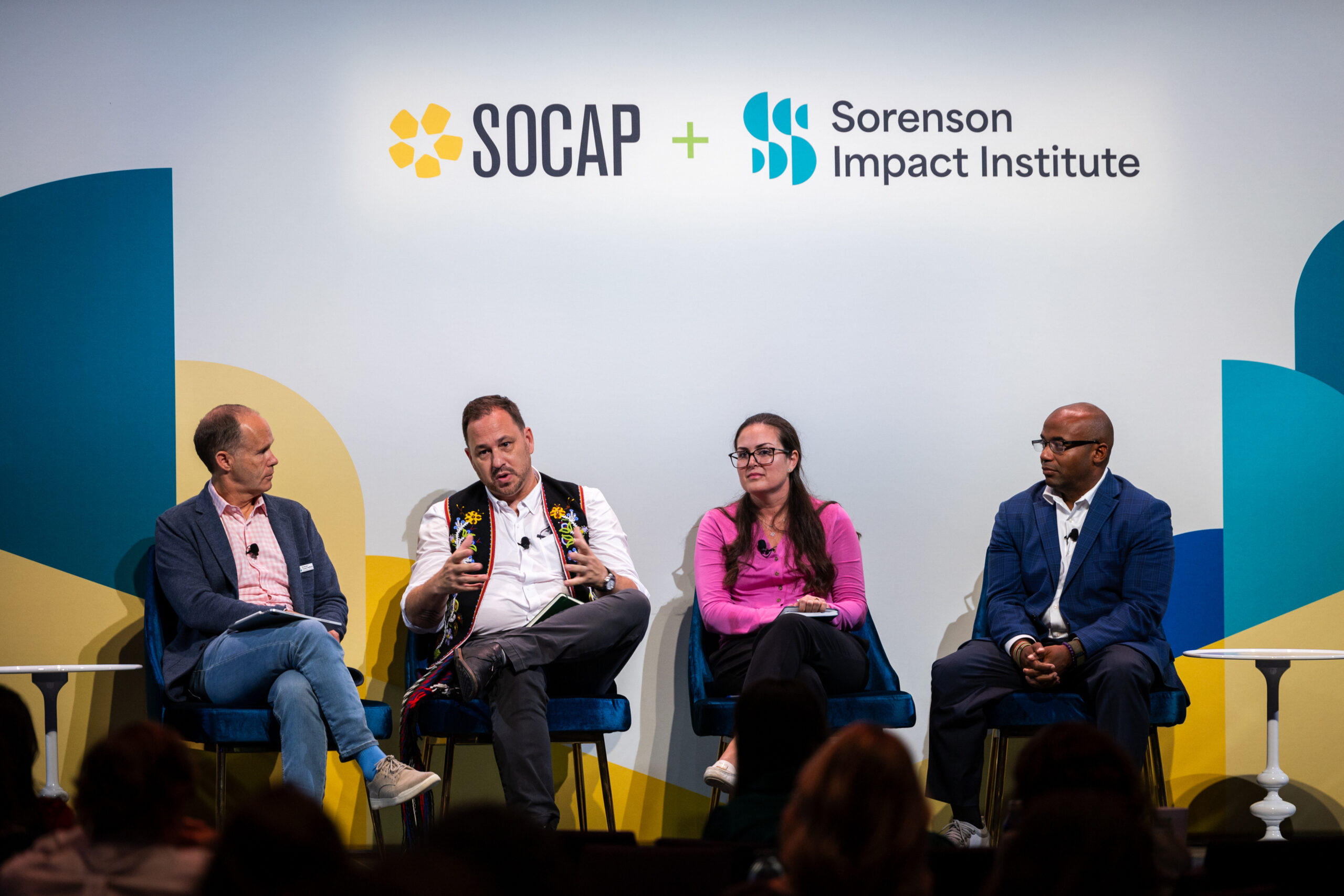In Partnership with Raven Indigenous Impact Foundation, Seven Generations Capital, and the NDN Collective
At SOCAP24, we are bringing systemic change to the heart of our dialogues, with many in the impact space joining us with curiosity about ways to invest in more equitable, regenerative frameworks. Indigenous peoples have long been at the forefront of social and environmental stewardship, yet their contributions often go unrecognized in mainstream forums.
“Historically, less than 0.5% of philanthropy has gone to Indigenous peoples in the United States,” says Thalia Carroll-Cachimuel, Director of Philanthropic Networks at NDN Collective. “Scaling our work means building long-term relationships, not just transactional investments. It requires a commitment to learning, co-creating solutions, and supporting Indigenous-led movements at every level — from grassroots activism to policy and advocacy.”
Addressing this injustice aligns with SOCAP’s mission to create positive social and environmental impact, ensuring that Indigenous perspectives are integral to these efforts.
“It is an extraordinarily underserved market at all levels of the capital spectrum,” says Jeffrey Cyr, CEO of the Raven Indigenous Impact Foundation. While it is a failure of markets, it also represents an extraordinary opportunity in the marketplace.”
At SOCAP24, we are fortunate to be able to host Indigenous speakers across our content tracks, experts who bring long-standing experience in rooting impact in community, ancestral wisdom, land, and environmental stewardship. All of these are central to understanding and catalyzing systemic change with initiatives ranging from Indigenous approaches to AI, to reshaped food systems through forest-based harvest, to a workshop on supporting investor readiness for Indigenous innovation.
“One important message is that there are market-rate risk-adjusted opportunities to invest in, which can support inclusive growth and self-determination, values shared by a wide group of SOCAP attendees,” says Michael Hungerford, Co-Founder at Seven Generations Capital and Partner at Hungerford Properties. “Building relationships to increase trust and opportunity is a good place for values-aligned capital to start — and we want to encourage investors to learn about truth and reconciliation.”
SOCAP24 will once again host an opening Land Ceremony, led by three Indigenous guides, as an opportunity to ground ourselves and collectively express our intention to convene on Ramaytush Ohlone land.
We are also excited to expand upon these activities at SOCAP24 by establishing the Indigenous Lounge at SOCAP, hosted by the Raven Indigenous Impact Foundation, Seven Generations Capital, and the NDN Collective. Led by our partners and developed in response to attendee feedback, this dedicated space is intended to:
- Create a Central Meeting Place: Establish the Indigenous Lounge as a common ground for Indigenous participants at SOCAP to meet, share experiences, and build relationships.
- Foster Collaboration: Encourage cross-sector collaboration among Indigenous changemakers and allies, facilitate new opportunities for collaboration and impact, and increase access to resources and support for Indigenous initiatives and the co-creation of solutions to shared challenges.
- Showcase Indigenous Leadership: Highlight the contributions and leadership of Indigenous peoples in social, environmental, and economic innovation and enhance visibility and recognition of Indigenous innovation within the SOCAP community. Through live conversation, video recordings, and presentations, attendees will hear perspectives from a wide array of Indigenous leaders and communities.
By providing a dedicated space for connection, collaboration, and cultural exchange, SOCAP24 aims to amplify the long-standing efforts of Indigenous leaders and nurture partnerships and resources to drive positive change and create lasting impact in their communities and beyond.
To learn more about the impetus for hosting the Indigenous Lounge at SOCAP24 and to share more about the current and future state of investment in Indigenous innovation, we’ve collected responses to questions from Michael Hungerford of Seven Generations Capital, Jeffrey Cyr of Raven Indigenous Impact Foundation, and Thalia Carroll-Cachimuel of NDN Collective.
What is the historical and current state of funding for Indigenous entrepreneurs and businesses? How are your organizations and models addressing the barriers to access to capital?
Michael Hungerford: There is a long history and a varied list of barriers to Indigenous access to capital, and for Indigenous Nations and individuals to advance their own economic opportunities. Some of these barriers are shared with many other groups, while some are unique — and we do not speak for everyone. Indigenous peoples, with the support of allies, are working to advance reconciliation and address some of the previous limitations. An example of this includes barriers to ownership over the lands, creating barriers to lending and capital investment, and preventing investment on their own lands. This tide is changing over the last 15 to 20 years, and we intend to support this change.
Seven Generations Capital is a 100% Indigenous-owned, institutionally backed, private real estate and investment firm. We are guided by the Gwich’in ancestry and values of our founders, and we draw on over 50 years of successful investment experience from Hungerford Properties. Seven Generations Capital supports Indigenous peoples’s path to self-determination through financial inclusion and urban land development, focusing on community impact and values alignment, while respecting Indigenous knowledge and stewardship. We are leveraging our extensive experience in market-rate real estate investing to develop urban lands with significant advantages. We promote shared ownership of projects, cultural strengthening, and restoring the relationship to the land in ways that benefit the climate and regenerate native species.
Jeffrey Cyr: Historically, funding for Indigenous businesses has been dramatically less than what has been available to other businesses. This is inclusive of both private, public and philanthropic capital. While we have the emergence of new funds (like Raven), it is proportionally extremely small in comparison to what is needed.
To address the lack of patient, flexible Indigenous-led capital, Raven has created three funds. The first two funds are Indigenous impact venture capital funds that cover equity needs from the pre-seed to the Series C stage, investing in Indigenous enterprises and founders in Canada and the US. These funds are now closed and actively investing and exiting.
Raven’s newest fund is the Raven Indigenous Outcomes Fund ($50M) which is an outcomes contract-based fund that invests in community-driven projects with a sector focus on the health of Mother Earth (climate) and in the health sector with a focus on Type 2 Diabetes Interventions. The fund is currently open. It affected a First Closing in June ($20.5M) and is targeting a final close in March of 2025.
Thalia Carroll-Cachimuel: Through NDN Fund’s unique, flexible lending and our Indigenous movement-building work, we move braided capital in service of defending, developing, and decolonizing Indigenous peoples and Mother Earth. Capacity-building and power-building within our communities are integral to the success of our movement infrastructure model, providing Indigenous peoples with the technical knowledge and access to networks needed to further develop their economic infrastructure and systems. To date, we have funded about $10 million of loan capital to projects ranging from food systems, regenerative energy, and LANDBACK.
Over the next decade, NDN Fund will move more than $100 million in capital to projects that 1) uphold the principles of regenerative and just economies, and 2) are led by and in service to Indigenous communities. We do this through two lending programs: Relief & Resilience and SEEDING (Social Enterprise & Economic Development for Indigenous Growth). In addition, after just the six years we have been in operation, our grantmaking will total $100 million by the end of 2024.
Why is bringing Indigenous leadership and perspectives to SOCAP24 important for your work and the impact community?
Carroll-Cachimuel: Bringing Indigenous leadership and perspectives to SOCAP is imperative for amplifying the voices of our communities, who have long been excluded from the dominant narratives around finance and impact. Indigenous knowledge systems provide essential insights and solutions to the complex, interconnected challenges of climate change. By centering these perspectives at SOCAP, we are not only advocating for investment in Indigenous businesses and initiatives, but also pushing the broader impact community to rethink its engagement with capital, power, and sustainability.
Our presence at SOCAP allows us to amplify our work at NDN Collective and create pathways for Indigenous communities to not only access capital but to lead in shaping the future of global impact investing. We affirm that Indigenous leadership is integral to shaping just economies. It allows us to advocate for investments that directly benefit our communities and to build long-term, sustainable futures for all people and Mother Earth. This presence opens up collaborative opportunities between Indigenous-led organizations and impact investors who are looking to align their work with movements focused on land reclamation, climate action, and systemic change.
Indigenous leadership at SOCAP is essential for building an equitable, sustainable future. These perspectives directly challenge and reimagine the traditional frameworks of capital, investment, and economic growth. Our communities have long-held sustainable, regenerative approaches to land stewardship and resource management — models that are urgently needed in today’s climate and impact sectors.
Cyr: It is critical that the ecosystem actors at SOCAP (asset holders, investors, asset managers, eco-system allies) understand the differing perspectives of Indigenous peoples and communities and how important it is that capital “shows up” differently and not in an extractive manner. Secondly, we believe that Indigenous understandings and epistemology provide a different frame for understanding impact and how it is measured. Indigenous leadership is also critical in building partnerships and collaborations through Indigenous intermediation with markets and capital providers so that it is possible to onboard more capital into Indigenous communities.
Hungerford: Like many other groups that face marginalization and systemic racism, Indigenous community and individual priorities may not have the stage to share the harsh realities or opportunities with international audiences. Time and energy are often taken up with the day-to-day addressing of the urgent needs of communities and individuals.
As an Indigenous company, with 50 years of experience in market-rate real estate, we are able to share our experience with Indigenous partners. As we do that, we have a responsibility to share with the impact investment community how capital can bring needed change to Indigenous communities.
How do you recommend fellow investors, fund managers, and changemakers to join you as allies? What’s next?
Cyr: Interested allies and changemakers should seek out Indigenous partners at SOCAP and be open to looking at new pathways to invest in our communities that may challenge their existing investment thesis and strategies. While challenging to usual practices, these are extraordinary moments of learning and building new relationships that are extremely rewarding and lead to new and innovative practices — exactly where impact investing and the social capital marketplace need to move. We invite you to be in relationship with us. We think this is the best way to show up. Take a long view and put aside traditional expectations of finance, and be flexible and adaptable.
At Raven, we’re looking to bring both deeper impact and more scale to our investment work. In future iterations, we intend to expand this model, at the request of our Indigenous brothers and sisters, to the U.S., New Zealand, Australia, and South America. We see a moment upon us where Indigenous peoples and communities are pivoting from surviving to thriving, with growing investment possibilities and a broad resurgence.
Hungerford: Action is rooted in relationship. This is best done through meeting and hearing from the wide array of communities and peoples. We would rather our Indigenous partners, members, and leaders share the importance and need for change in their own words. As a result, we are showcasing testimonials and perspectives online and will have QR codes available at the Indigenous Lounge where you can hear directly from them. While Seven Generations Capital is an Indigenous company, it is not our voice alone that we want to ensure is heard, it is the voice of Indigenous nations and individuals.
Building relationships to increase trust and opportunity is a good place for values-aligned capital to start — and we want to encourage investors to learn about truth and reconciliation. There are opportunities for both market-rate and impact-first strategies across asset classes — and being proactive as an investor is essential to solving the barriers to access. We have spent eight years and 20,000 hours in relationship development, aligning our values and learning with Indigenous partners to be ready for this moment, and we are ready to launch opportunities that align capital directly with communities and meet the needs of institutional investors.
Carroll-Cachimuel: As NDN Collective dives deeper into our climate justice work, we are ensuring that the conversations we are having across the globe result in concrete capital access and investments for Indigenous founders, leaders, and communities across all socio-cultural regions and ecosystems. It is the Indigenous people who are on the front lines of climate change adaptation, mitigation, and biological diversity protection across all regions and ecosystems in the world. We’re also working to build deeper relationships with a broader range of philanthropic and impact investors, ensuring they understand the critical role Indigenous communities play in sustainable land stewardship and climate action. This involves creating more pathways for funders to align their capital with Indigenous values and supporting long-term, trust-based funding models that move beyond the traditional grantmaking frameworks.
At NDN Collective, we are building wealth, closing the racial wealth gap, and advancing LANDBACK through scalable models that prioritize Indigenous sovereignty. To amplify these efforts, investors can start by aligning their portfolios with Indigenous values — prioritizing regenerative economies over extractive ones, and supporting social impact funds, such as our NDN Fund, which specifically uplifts Indigenous businesses and community development projects.
We are looking for investors in our braided capital approach, particularly around our power-building funds at NDN Fund. By investing both loan and grant capital, fellow investors will support our multi-faceted approach to investing in Indigenous-led projects.
Increased access to capital will require continued collaboration with global impact investors and fund managers who are committed to not just mitigating climate risk but actively building regenerative economies. We will continue to support global partnerships with Indigenous leaders from other parts of the world who are similarly advocating for regenerative economies, sustainable development, and climate justice. By aligning efforts globally, we can create a powerful, collective voice that ensures that Indigenous perspectives and solutions are properly resourced and are at the center of all solutions.




